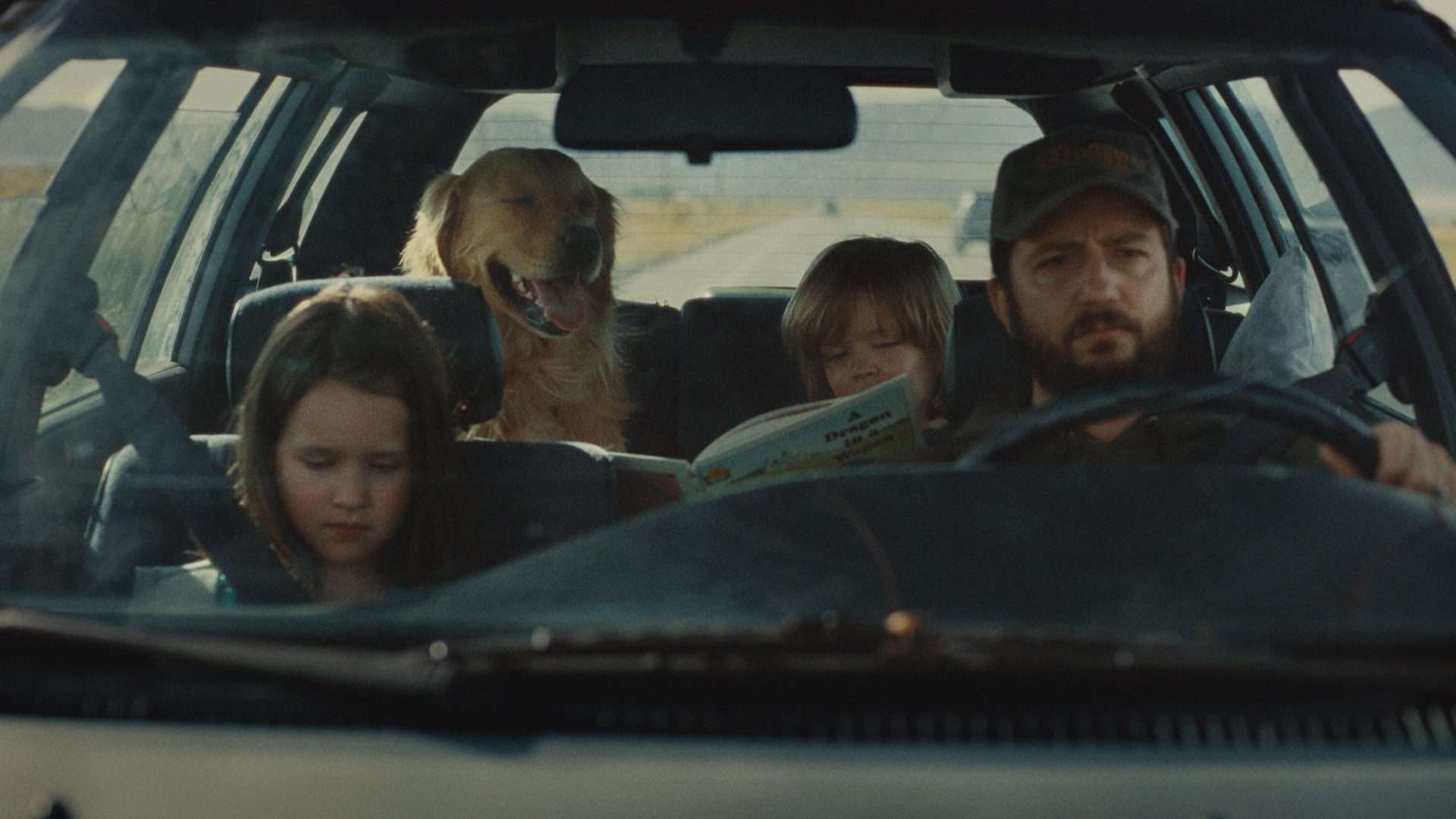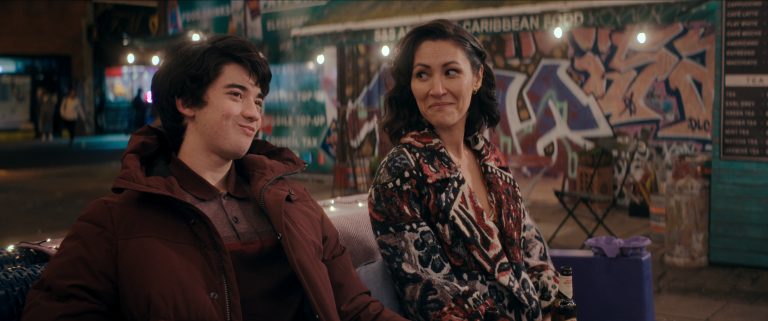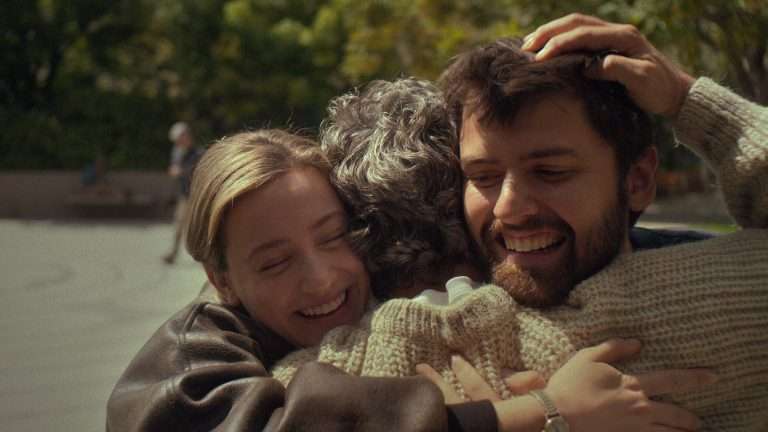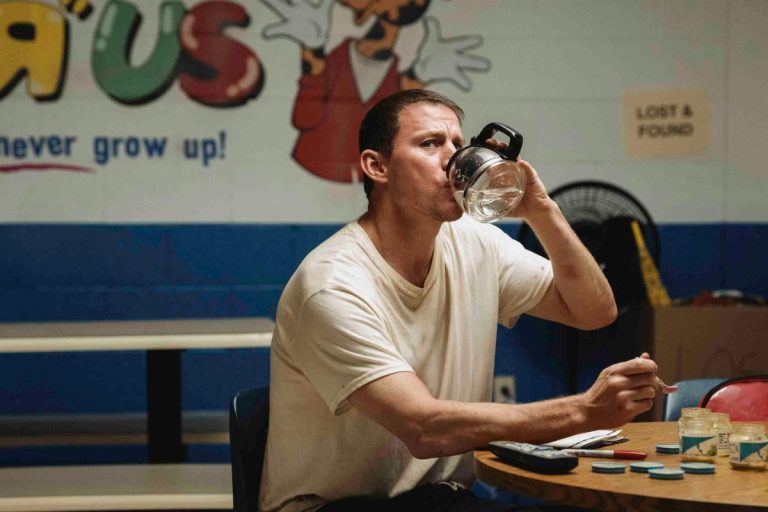Cole Webley’s “Omaha” (2025) is about fatherhood, loss, and change. However, the script doesn’t explicitly talk about any of it. Instead, it drip-feeds information throughout the film’s duration. It begins with a father (John Magaro) waking up at dawn and getting his kids out of bed to leave home shortly after. He asks them to pack some things but doesn’t share any specific details as to where they are going or why they are leaving home all of a sudden. Still, it seems sudden since the kids are not prepared for any of it.
The father brings the kids to the car as he has a word with a local sheriff. As an audience, we see these events mainly through the daughter, Ella’s (Molly Belle Wright) perspective. Her observant eyes sense her dad’s anxiety but cannot hear any of what he speaks. As they start driving, she keeps trying to understand his intent behind this trip. The film reveals as much as she learns about its events and effectively puts us in her emotional state. That makes it even harder to gauge the dad’s mental state, who keeps his worries to himself.
As a dad of teenagers, it doesn’t seem odd or surprising that he doesn’t dump his worries on them. However, he remains depressingly elusive about their immediate future. The three briefly talk about a recent family tragedy that follows them, emotionally, till that day. Still, the dad vaguely responds about how it affects him. Throughout the film, he appears as a mystery that Ella desperately tries to solve. Unlike her, her younger brother Charlie (Wyatt Solis) isn’t old enough to understand the gravity of the situation.
Charlie is affected by immediate fears and joys like getting an ice cream after his dad says a cuss word or not having a toy that he likes. Unlike him, Ella is precocious, even if she is just in her tween years. It isn’t natural for someone her age to be mature, but she is surprisingly considerate and emotionally available. At times, she hopes to be spontaneous and carefree as a kid would want to be. However, she silently eats up her sadness as her dad stays lost in undisclosed worries.
Much of Omaha’s character insights slip through the cracks in their relationship during a day and a half they spend together. The film remains faithful to its stripped-down approach and refrains from any direct expositions. We see what ticks them, surprises them, or scares them as it shows up on their faces or in their body language. It seeps through interactions often not directly connected to any specific life event. Whether it is Ella’s need for reckless abandon or the dad’s unspoken cry for help, the subtext is communicated with a deliberate handling of its material.

“Omaha” is connected to a specific tragic event that affected many families such as Ella and Charlie’s. However, even without that context, the film works tremendously well on an emotional level. The credit goes to the film’s indirect exploration of the aforementioned universal themes of fatherhood, loss, and change. Within just a day or so, the kids go through a whirlwind as they experience loss shortly after trying to recover from another one. The dad, in this case, appears flawed and irresponsible, especially at times when he doesn’t care enough about his kids’ emotional needs.
The dad seems particularly unlikable at times when he tells his barely 10-year-old daughter to act maturely. Then, there are times when he tries to be a father who is fun to be around and cares for their joy. The script humanistically examines his complicated psyche and presents him as a man in an inescapable dilemma, struggling with helplessness and hopelessness. He appears dejected, who desperately seeks someone to speak with but is not fully ready to open up. This internal chasm gets communicated seamlessly through John Magaro’s moving performance.
Magaro’s weary eyes express the dad’s anguish, hiding underneath his façade as he makes his kids believe that everything is fine. Magaro manages to present these two simultaneous realities – in his internal and external worlds – with vivid details, despite being mostly silent. Cole Webley’s direction is assured, with more focus on subjectivity, appropriate to highlight the interiority of its characters. He points out their individual views on loss, detachment, and resilience.
As the characters listlessly wander through the streets of America, “Omaha” feels like a fairy tale, although filled with a constant underlying fear that it will end within a matter of moments. It ties in with the film’s real-life inspiration, which is foreshadowed throughout the film. Filled with a brooding, discomforting silence, “Omaha” refuses to leave your mind till long after the credits roll.



![There Are No Saints [2022] Review: A bleak but traditional Revenge drama](https://79468c92.delivery.rocketcdn.me/wp-content/uploads/2022/04/There-Are-No-Saints-2022-768x432.jpeg)




